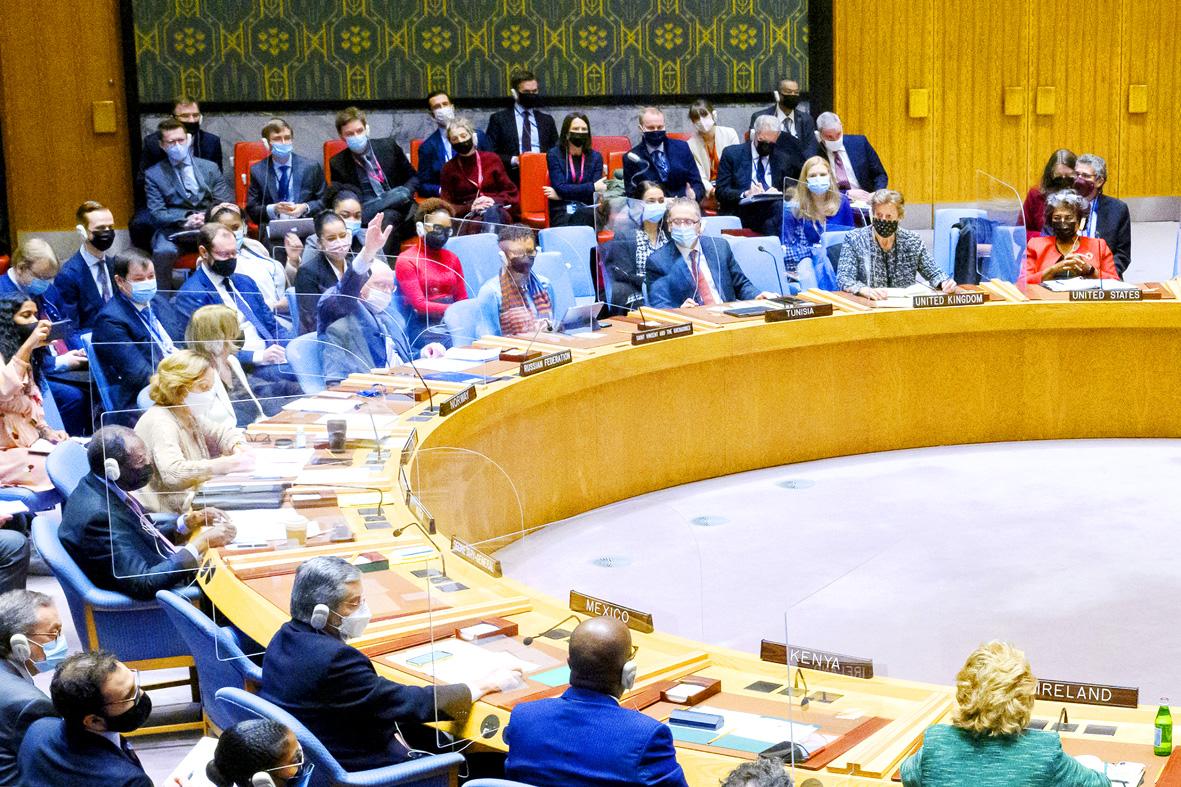Russia on Monday vetoed a UN Security Council resolution formally linking climate change and global security that was supported by a majority of UN member states.
Backed by Niger and Ireland, the draft resolution called on UN Secretary-General Antonio Guterres to “integrate climate-related security risk as a central component into comprehensive conflict-prevention strategies.”
The text won support from 12 of the council’s 15 members.

Photo: UN via AP
China abstained, while India voted against it, saying that global warming is chiefly an issue related to economic development, rather than international security.
The resolution had called on the UN secretary-general to report within two years “on the security implications” of climate change on issues addressed by the council, and sought recommendations on how these risks could be addressed.
For diplomats speaking on condition of anonymity, Russia’s opposition was difficult to understand, given that the resolution itself “was not radical,” one of them said.
US Ambassador to the UN Linda Thomas-Greenfield said that there was “no justification” for the veto.
Before the vote, Irish Ambassador to the UN Geraldine Byrne Nason said that the resolution was only a “modest first step.”
“We need to better understand this link” between security and climate change, she said, adding: “We need to look at it globally.”
Nigerien Ambassador to the UN Abdou Abarry called opposition to the draft resolution “shortsighted.”
Following the vote, Nason and Abarry denounced vetoes — which permanent council members the US, Britain, France, Russia and China have been able to wield since the UN was founded after World War II — as “an anachronism.”
“This council will never live up to its mandate for international peace and security if it does not adapt. It must reflect the moment we are now living in, the threats to international peace and security which we now face,” they said.

CHAOS: Iranians took to the streets playing celebratory music after reports of Khamenei’s death on Saturday, while mourners also gathered in Tehran yesterday Iranian Supreme Leader Ayatollah Ali Khamenei was killed in a major attack on Iran launched by Israel and the US, throwing the future of the Islamic republic into doubt and raising the risk of regional instability. Iranian state television and the state-run IRNA news agency announced the 86-year-old’s death early yesterday. US President Donald Trump said it gave Iranians their “greatest chance” to “take back” their country. The announcements came after a joint US and Israeli aerial bombardment that targeted Iranian military and governmental sites. Trump said the “heavy and pinpoint bombing” would continue through the week or as long

TRUST: The KMT said it respected the US’ timing and considerations, and hoped it would continue to honor its commitments to helping Taiwan bolster its defenses and deterrence US President Donald Trump is delaying a multibillion-dollar arms sale to Taiwan to ensure his visit to Beijing is successful, a New York Times report said. The weapons sales package has stalled in the US Department of State, the report said, citing US officials it did not identify. The White House has told agencies not to push forward ahead of Trump’s meeting with Chinese President Xi Jinping (習近平), it said. The two last month held a phone call to discuss trade and geopolitical flashpoints ahead of the summit. Xi raised the Taiwan issue and urged the US to handle arms sales to

BIG SPENDERS: Foreign investors bought the most Taiwan equities since 2005, signaling confidence that an AI boom would continue to benefit chipmakers Taiwan Semiconductor Manufacturing Co’s (TSMC, 台積電) market capitalization swelled to US$2 trillion for the first time following a 4.25 percent rally in its American depositary receipts (ADR) overnight, putting the world’s biggest contract chipmaker sixth on the list of the world’s biggest companies by market capitalization, just behind Amazon.com Inc. The site CompaniesMarketcap.com ranked TSMC ahead of Saudi Aramco and Meta Platforms Inc. The Taiwanese company’s ADRs on Tuesday surged to US$385.75 on the New York Stock Exchange, as strong demand for artificial intelligence (AI) applications led to chip supply constraints and boost revenue growth to record-breaking levels. Each TSMC ADR represents

Pro-democracy media tycoon Jimmy Lai’s (黎智英) fraud conviction and prison sentence were yesterday overturned by a Hong Kong court, in a surprise legal decision that comes soon after Lai was jailed for 20 years on a separate national security charge. Judges Jeremy Poon (潘兆初), Anthea Pang (彭寶琴) and Derek Pang (彭偉昌) said in the judgement that they allowed the appeal from Lai, and another defendant in the case, to proceed, as a lower court judge had “erred.” “The Court of Appeal gave them leave to appeal against their conviction, allowed their appeals, quashed the convictions and set aside the sentences,” the judges